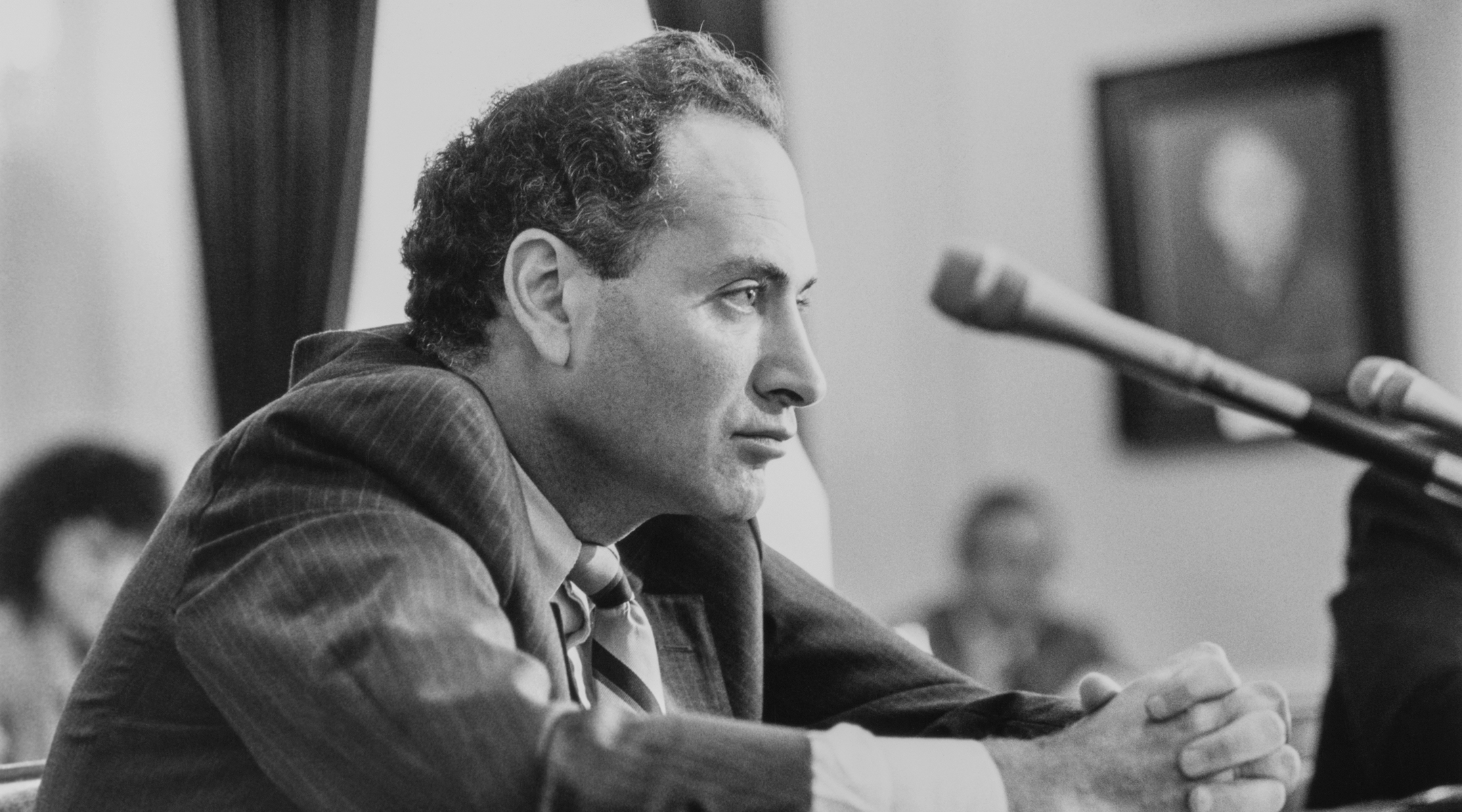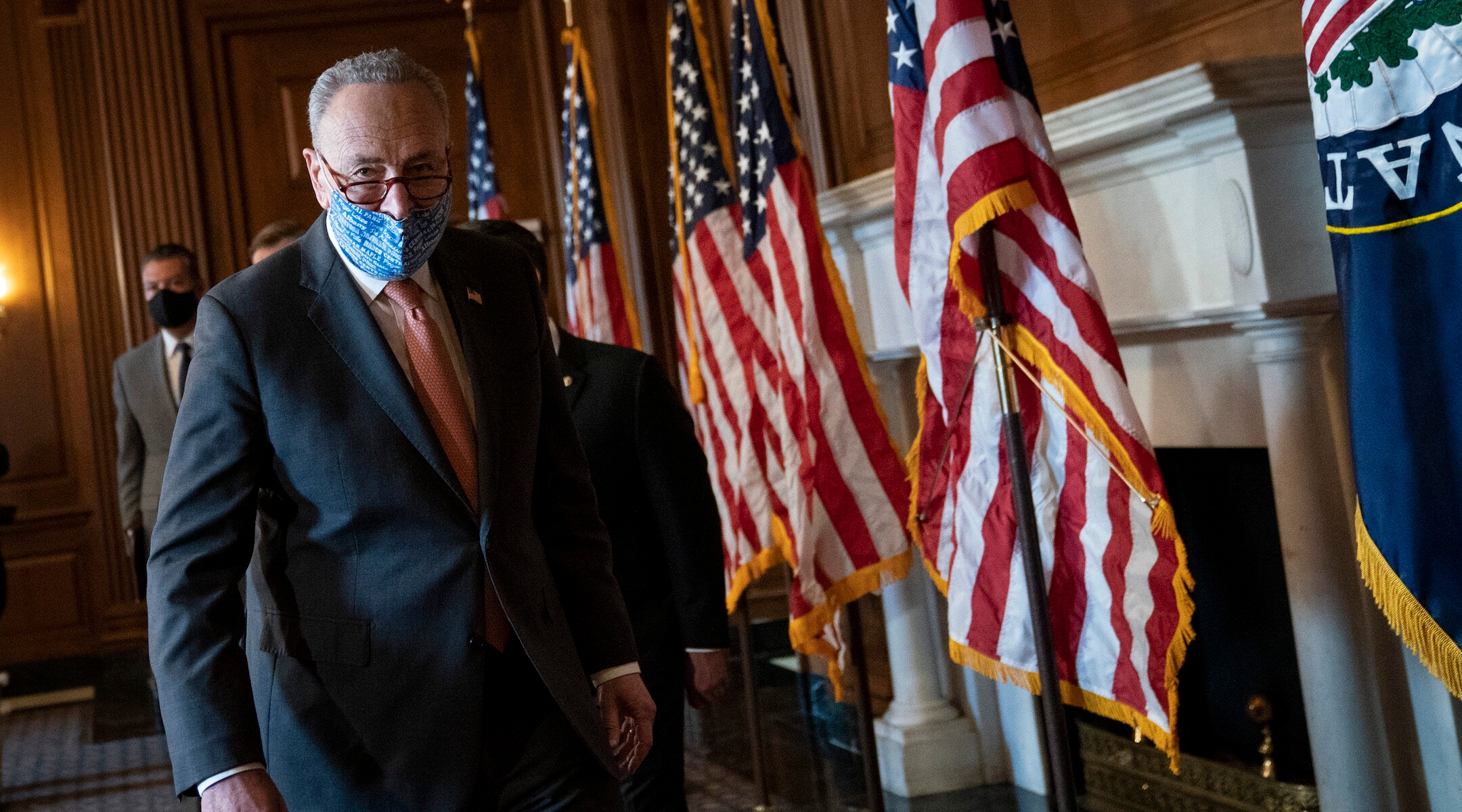(JTA) — Chuck Schumer could not let the moment pass without mentioning its Jewish history.
Georgia’s new senators, Jon Ossoff and Raphael Warnock, were sworn in on Wednesday, making Schumer the new Senate majority leader — the first-ever Jew in that powerful role.
Never afraid to reference his Yiddishkeit, Schumer recalled his roots in an address in the Senate chamber. And he got biblical, too.
“With the swearing in of these three senators, the Senate will turn to Democratic control … under the first New York-born majority leader in American history,” he said. “A kid from Brooklyn, the son of an exterminator and a housewife, a descendant of victims of the Holocaust.
“That I should be the leader of this new Senate majority is an awesome responsibility. Awesome in the biblical sense, as the angels that trembled in awe before God. Today I feel the full weight of that responsibility.”
In terms of strides for diversity, the headlining news of the day was Kamala Harris’ milestone moment becoming the first woman and first woman of color to serve as vice president. But Inauguration Day was also more quietly full of Jewish history. Schumer became the highest-ranking elected Jewish politician in American history. Ossoff was sworn in as Georgia’s first Jewish senator — on a historic Hebrew Bible and carrying records from his forebears’ arrival at Ellis Island. Doug Emhoff, Harris’ Jewish husband, became the country’s first “second gentleman.”
In his short speech, Schumer borrowed a line that President Joe Biden had used a few hours earlier to hail Harris’ glass ceiling-shattering milestone and applied it to Jews.
“As President Biden said in his inaugural address: ‘Don’t tell me things can’t change,’” he said.
The honeymoon likely won’t last long for Schumer, who helms the slimmest of majorities in the Senate — a 50-50 split of Democrats and Republicans that Harris can break with a tie-breaking vote — amid unprecedented polarization. Democrats were outraged by the deadly Capitol insurrection two weeks ago staged by right-wing extremists, some of them anti-Semitic and white supremacist, and they called for the immediate removal of then-President Donald Trump for instigating the horror. For Republicans, while the event forced a widespread reckoning for their party, over 140 lawmakers combined in the House and Senate continued to back Trump’s false claims that the election results were fraudulent.

Jon Ossoff with his wife, Dr. Alisha Kramer, at the presidential inauguration ceremony, Jan. 20, 2021. (Tom Williams/CQ-Roll Call, Inc via Getty Images)
If he can effectively corral his Senate troops, Schumer will have a chance to leave an outsized mark on a range of issues that Biden has signaled he wants to tackle post-pandemic, from climate change to immigration to health care. Schumer, a longtime moderate, has shown signs that he has been emboldened by the Macchiavellian moves of his predecessor Mitch McConnell, who often departed from traditional protocols to ram through Congress everything from federal judicial appointees (and multiple Supreme Court justices) to high-stakes bills.
In his speech to the virtual Democratic National Convention in August, Schumer said that the Senate would “bring bold and dramatic change to our country” if Democrats won control of the chamber.
As for how he will make that happen, his former communications director Stu Loeser argued that unlike many senators, Schumer is savvy about forming small groups of like-minded Republican and Democratic lawmakers who can connect over noncontroversial issues.
“So say there’s a Republican senator from, you know, Pennsylvania, a Democratic senator from Wisconsin, and all of us have this same problem that we’re working on in New York. Say this is not the only place in the country that has this kind of former defense plant that needs a new use,” Loeser told the Jewish Telegraphic Agency. Schumer’s approach is “‘we’re going to build a coalition because we’ll find out the other ones, and we’re going to get these guys to work on us on a bipartisan basis.’
“He is acutely aware of what drives the senators. It’s not like you approach it from the idea of I’m going to get people across party lines, which is toxic now. But it’s I’m going to find [three to five] Republicans who actually have the same approach as the Democrats and get their support.”
Becoming majority leader is a possible climax to a career that many have called extremely ambitious, even by Washington standards. In a 1986 book, his sister, Fran Schumer, a journalist, wrote: ”Ever since he was 8, my older brother has wanted to recreate in the world his position in our family — president of the Schumers, favorite son of the United States.”

Schumer as a House rep in 1990. (Maureen Keating/CQ Roll Call via Getty Images)
It was a lofty goal for the kid from Marine Park, a neighborhood deep in Brooklyn that in the 1950s and ’60s was crowded with Jewish, Italian, Puerto Rican and Caribbean immigrants. After graduating from James Madison High School, he attended Harvard as an undergraduate and law student in the late ’60s, where he felt out of place among its legions of WASPy and activist students. He dove right into politics without ever practicing law. He served in the New York State Assembly from 1974 to 1981, then in the U.S. House of Representatives, representing three different districts in Brooklyn and Queens through 1999, when he was elected to the Senate.
Throughout his career, Schumer has been a staunch ally of Jewish communities in his home state and of Israel. In 2015 he was tortured over the debate on the Iran nuclear deal, which pitted what he and many other Israel defenders saw as the Jewish state’s security interests against the Obama administration’s good intentions. Schumer eventually would be one of a select few Democrats who opposed the deal.
In a memorable moment on Jon Stewart’s “Daily Show,” the host mocked an MSNBC reporter for trying to pin down Schumer on the Iran deal while they chatted in a diner.
“You brought an old New York Jewish man to a diner?” Stewart said. “You realize what this means — you’re never going to end up talking about the Iran deal. You’re just going to end up talking about f***ing diners!”
That public image as a quintessential New York Jew has been fodder for his enemies and played into political rhetoric that some see as coded anti-Semitism.
But Schumer has never shied from his roots as a Jew or New Yorker. Politico marveled this week at how Schumer, in the midst of his ascension and still dealing with the fallout from the insurrection at the U.S. Capitol, found time to appear at a Queens community board meeting and an Upper West Side Democratic club.
Loeser recalled how Schumer and his family, longtime members of Congregation Beth Elohim in Brooklyn’s Park Slope, spent a Christmas Eve in the early 2000s at a restaurant in Chinatown. When a terrorism threat came up that night, Loeser tried to reach him, but his phone was off. So Loeser resorted to calling Chinese restaurants across Lower Manhattan, asking if the senator was there.
Loeser eventually found him, but only after hours of trouble. The problem: He and his family “looked like everyone else” to the restaurants.
“They kept saying to me that ‘no, there’s no U.S. senator here,’” Loeser said. “‘Just a Jewish family.’”
JTA has documented Jewish history in real-time for over a century. Keep our journalism strong by joining us in supporting independent, award-winning reporting.






